AI Technician Salary vs AI Engineer Salary in the Store Automation Field

You want to know which job pays more. The latest numbers show that the average ai technician salary is higher than the average software engineer salary. Here is a quick look at the data:
Job Title | Average Annual Salary | Min Salary | Max Salary |
|---|---|---|---|
AI Technician | $180,581 | $80K | $338K |
Software Engineer | $138,592 | $0K | $400K |
Salary differences can shape your career choices. Many new graduates earn up to $131,000, making tech roles attractive early on. If you aim for high pay, specialized jobs in AI often offer better rewards, especially in major cities.
Key Takeaways
AI technicians earn an average salary of $180,581, significantly higher than the average software engineer salary of $138,592.
In major tech cities, AI technicians can earn 20-40% more than software engineers, making AI roles attractive for high pay.
Education and certifications in AI and machine learning can boost your salary and job prospects, with specialized skills in demand.
Experience level greatly impacts salary; moving from entry-level to senior roles can nearly double your pay in AI careers.
The job market for AI roles is growing rapidly, with a projected growth rate of 17.9% over the next decade, indicating strong demand for skilled professionals.
Salary Comparison

AI Technician Salary vs Software Engineer Salary
You want to know how the ai technician salary compares to the software engineer salary. The numbers show a clear difference. AI technicians often earn more than software engineers, especially in major tech hubs. You can see this in places like Silicon Valley, Seattle, and New York. AI engineers in these cities earn between $80,000 and $200,000 each year. Software engineers in Seattle earn about $126,000, while those in Silicon Valley earn around $134,000. When you adjust for the cost of living, a Seattle salary can feel like earning $180,000 in San Francisco.
AI technicians usually earn 20-40% more than software engineers in top tech cities. This gap makes the ai technician salary very attractive if you want to work in high-paying areas.
Average and Median Salaries
You should look at both average and median salaries to get a full picture. The average ai technician salary is $180,581. The average software engineer salary is $138,592. Median salaries also show a strong difference. In 2023, the median annual wage for AI engineers was $145,080. Software engineers had a median annual wage of $130,160. Senior AI engineers can earn a median salary of $212,928. Software developers have a median salary of $133,080.
Here is a table that shows the latest median salaries:
Role | Median Salary |
|---|---|
AI Engineer | $145,080 |
Senior AI Engineer | $212,928 |
Software Engineer | $130,160 |
Software Developer | $133,080 |
You can see that the ai technician salary stays higher at both entry and senior levels. Over the past five years, salaries for AI technicians have changed. In 2021, the average salary for AI technicians dropped by 2.1%. Machine learning specialists saw even bigger drops. However, tech salaries overall went up by 6.9% in 2021. Software engineers averaged $104,566 that year. From 2018 to 2019, software engineers in machine learning saw a 22% salary increase.
AI engineers (median annual wage): $145,080 (2023)
Software engineers (median annual wage): $130,160 (2023)
Data scientists (median annual wage): $108,020 (2023)
Computer hardware engineers (AI hardware): $138,080 (2023)
High-End Earning Potential
You might wonder how much you can earn at the top companies. The highest ai technician salary can reach impressive numbers. At Meta, AI engineers can earn up to $451,000 in total compensation. Machine learning engineers at Meta can earn up to $440,000. AI research scientists can reach $489,000. At Microsoft, AI engineers can earn up to $375,000. At Amazon, AI engineers can earn up to $259,000. Nvidia pays AI engineers up to $289,000. OpenAI offers software engineers total compensation ranging from $248,000 to $1.25 million.
Here is a table showing high-end salaries at top companies:
Company | Role | Average Base Salary | Total Compensation |
|---|---|---|---|
Meta | AI Engineer | $201,906 | Up to $451,000 |
Microsoft | AI Engineer | $151,573 | Up to $375,000 |
Amazon | AI Engineer | $143,747 | Up to $259,000 |
Nvidia | AI Engineer | $186,121 | Up to $289,000 |
OpenAI | Software Engineer | N/A | $248K - $1.25M |
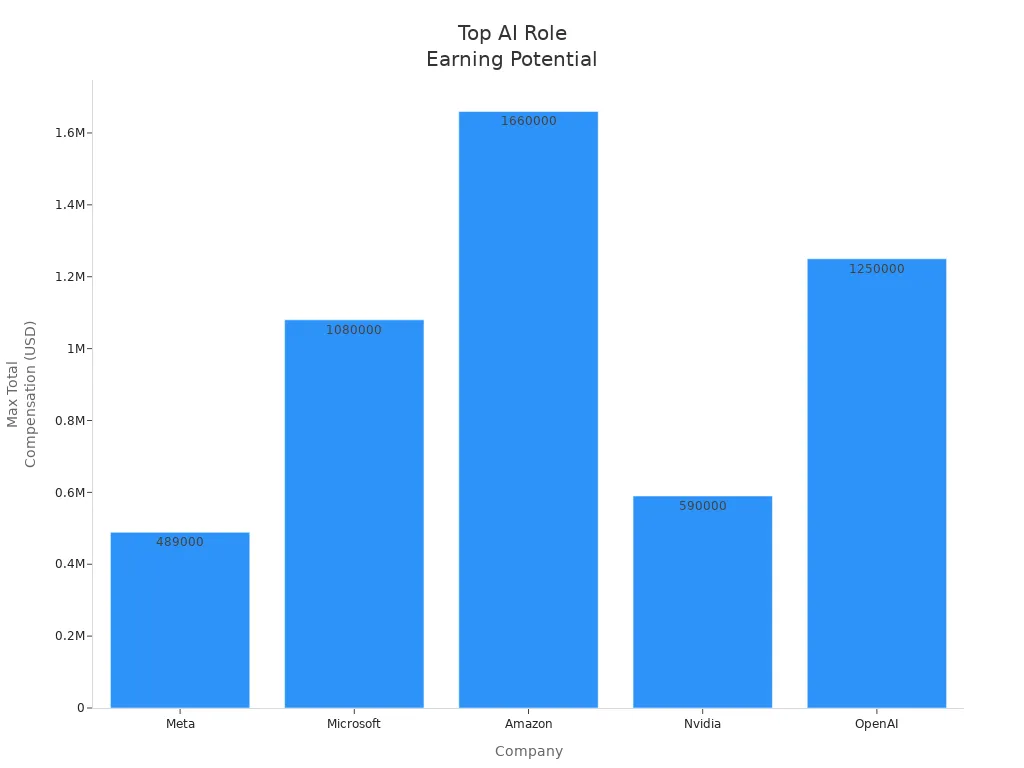
You can see that the ai technician salary at the highest levels can compete with or even beat the top software engineer salaries. Some software engineers working on AI projects at companies like Amazon and OpenAI can earn more than $1 million. Most AI technicians and engineers earn less, but the top earners show how high the ceiling can go.
If you want to maximize your earnings, you should consider roles in AI at major tech companies. The ai technician salary offers strong growth and high rewards, especially if you gain experience and work in top locations.
Salary Factors
Education & Certifications
Your education and certifications play a big role in how much you can earn. Employers look for degrees in computer science, engineering, or math. Special certifications can boost your pay even more. Here are some certifications that can increase your salary:
Certification Name | Impact on Salary |
|---|---|
AWS Certified DevOps Engineer – Professional | Can significantly increase salary |
Google Professional Cloud DevOps Engineer | Can significantly increase salary |
Certified Kubernetes Administrator (CKA) | Can significantly increase salary |
HashiCorp Certified Terraform Associate | Can significantly increase salary |
You can also stand out with certifications focused on AI and machine learning. These show you have the skills employers want:
Certification Name | Description |
|---|---|
Google Professional Machine Learning Engineer | Validates ability to design, build, and manage machine learning models on Google Cloud. |
AWS Certified Machine Learning – Specialty | Focuses on developing, deploying, and maintaining machine learning models in the AWS cloud environment. |
Microsoft Certified: Azure AI Engineer Associate | Demonstrates proficiency in implementing AI and machine learning solutions using Microsoft Azure. |
Certified AI Practitioner (CAIP) | Covers fundamental AI concepts and machine learning techniques, ideal for proving AI expertise. |
TensorFlow Developer Certificate | Showcases ability to build and train deep learning models using TensorFlow. |
IBM AI Engineering Professional Certificate | Covers essential AI and ML topics with hands-on projects using tools like Python and TensorFlow. |
Tip: Earning these certifications can help you qualify for higher-paying jobs and make your resume stand out.
Experience Level
Your experience level affects your salary a lot. Entry-level jobs pay less, but as you gain skills, your pay goes up. Here is how experience changes your salary and responsibilities:
Experience Level | Salary Range | Responsibilities |
|---|---|---|
Entry-Level | $90,000 - $120,000 | Supporting model development, preparing datasets, assisting with experimentation. |
Mid-Level | $120,000 - $155,000 | Independently building and deploying models, mentoring junior staff. |
Senior-Level | $155,000 - $200,000+ | Leading projects, designing architectures, aligning initiatives with business goals. |
You can see that moving from entry-level to senior-level can almost double your pay. The ai technician salary grows quickly as you take on more complex tasks.
Industry & Location
The industry you work in and where you live both impact your salary. Some industries pay more because they need special skills. Here is a look at average salaries by industry:
Industry Sector | Average Salary |
|---|---|
Finance and Insurance | $121,190 |
Motor Vehicle Manufacturing | $133,360 |
Healthcare | $110,473 |
Travel | $89,478 |
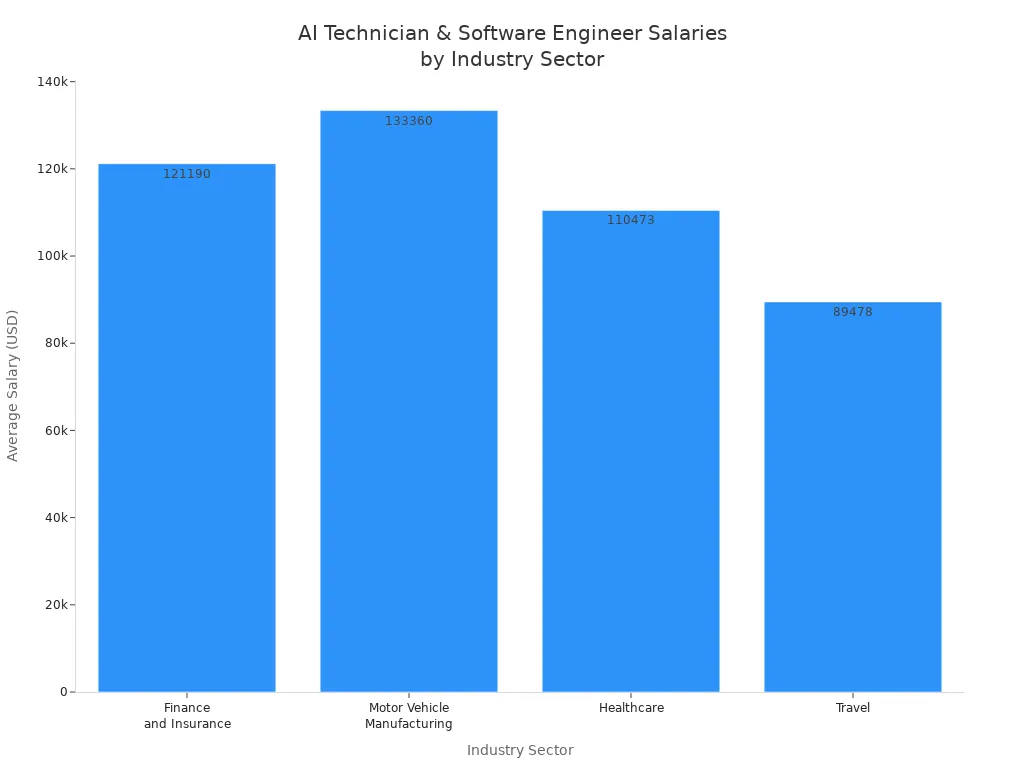
You will find the highest salaries in tech hubs like Silicon Valley and Seattle. These cities offer more money because many tech companies compete for talent. In the US, entry-level AI jobs start at $7,500 per month, but senior engineers can earn up to $20,833 per month. Western Europe, especially Switzerland, also pays well. In contrast, places like Eastern Europe and Latin America offer lower salaries.
Note: Where you work can make a huge difference. In some cities, the same job can pay more than twice as much as in others.
Role & Skills

AI Technician: Duties & Skills
You work as an AI technician when you turn ideas into working products. You use machine learning and deep learning to solve problems. You often build models, test them, and help teams use AI in real projects. You need strong programming skills in Python, R, or Java. You also use frameworks like TensorFlow and PyTorch. Most AI technicians have a master’s or Ph.D. in computer science or engineering. You may also work with computer vision and neural networks.
Here is a table that shows common AI roles, their duties, and skills:
AI Role | Primary Duties | Required Skills | Estimated Salary Range |
|---|---|---|---|
AI Technician | Implement AI concepts into functional products and services. | Master's/Ph.D., Python, R, Java, ML frameworks | $130,000 - $220,000+ annually |
Data Scientist (AI) | Analyze data to build predictive models and AI-driven solutions. | Master's/Ph.D., analytical skills, Python, R | $120,000 - $200,000+ annually |
AI Product Manager | Oversee the vision and strategy for AI products. | AI principles, product management experience | $110,000 - $190,000+ annually |
Robotics Engineer (AI) | Design and program robots that use AI for decision-making. | Robotics/Engineering degree, C++, Python, AI frameworks | $100,000 - $180,000+ annually |
AI Ethicist | Develop frameworks for ethical AI development and deployment. | Philosophy/law background, AI technology and ethics | $90,000 - $170,000+ annually |
AI Solutions Architect | Design and implement AI systems within organizations. | IT/Computer Science degree, cloud computing, AI services | $100,000 - $180,000+ annually |
You see that the ai technician salary stays high because these jobs need advanced skills and education.
You also need to know the most in-demand skills for AI technician roles:
Types of AI
Machine learning
Deep learning
Neural network architectures
Computer vision
Programming languages
Python
R
Java
C++
Libraries and frameworks
TensorFlow
NumPy
SciPy
Scikit-learn
PyTorch
Apache Spark
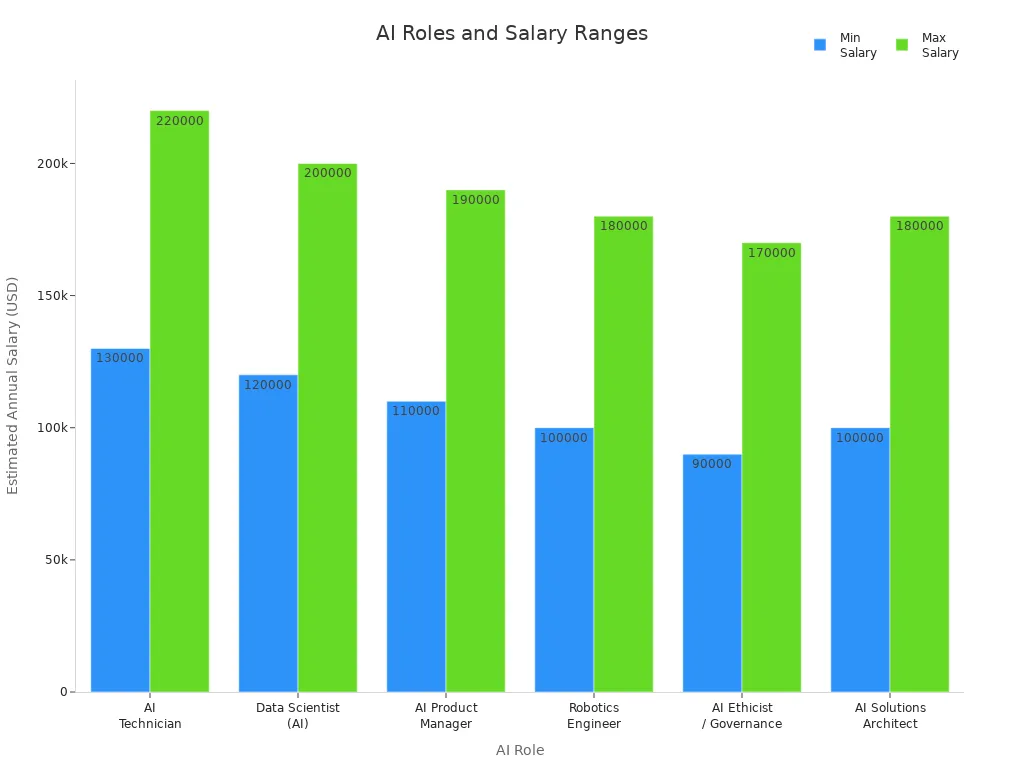
Software Engineer: Duties & Skills
You design, build, and maintain software as a software engineer. You write code in languages like Python, Java, C++, or JavaScript. You solve problems and use data structures and algorithms to make your code better. You use object-oriented design to keep your code organized. You help test software and make sure it works well. You also work with other people and share ideas.
Here is a table that shows the main responsibilities and skills for software engineers:
Responsibilities/Skills | Description |
|---|---|
Programming Languages | Write efficient code in Python, Java, C++, or JavaScript |
Problem-Solving Abilities | Break down complex problems into smaller parts |
Data Structures and Algorithms | Optimize code and improve performance |
Object-Oriented Design Concepts | Create modular and reusable code |
System Design and Architecture | Build reliable software with good performance and security |
Testing and Quality Assurance | Test software and review code for quality |
Deployment and Maintenance | Set up servers and keep software running smoothly |
Collaboration and Communication | Work with teams and share progress |
Adapting to New Advancements | Learn new technologies and best practices |
Programming languages can affect your salary. Here is a table of median salaries for software engineers by language:
Programming Language | Median Salary (USD) |
|---|---|
Clojure | $106,644 |
Erlang | $103,000 |
F# | $95,526 |
LISP | $95,000 |
Ruby | $93,000 |
Elixir | $92,959 |
Scala | $92,780 |
Perl | $90,073 |
Go | $89,204 |
Rust | $87,047 |
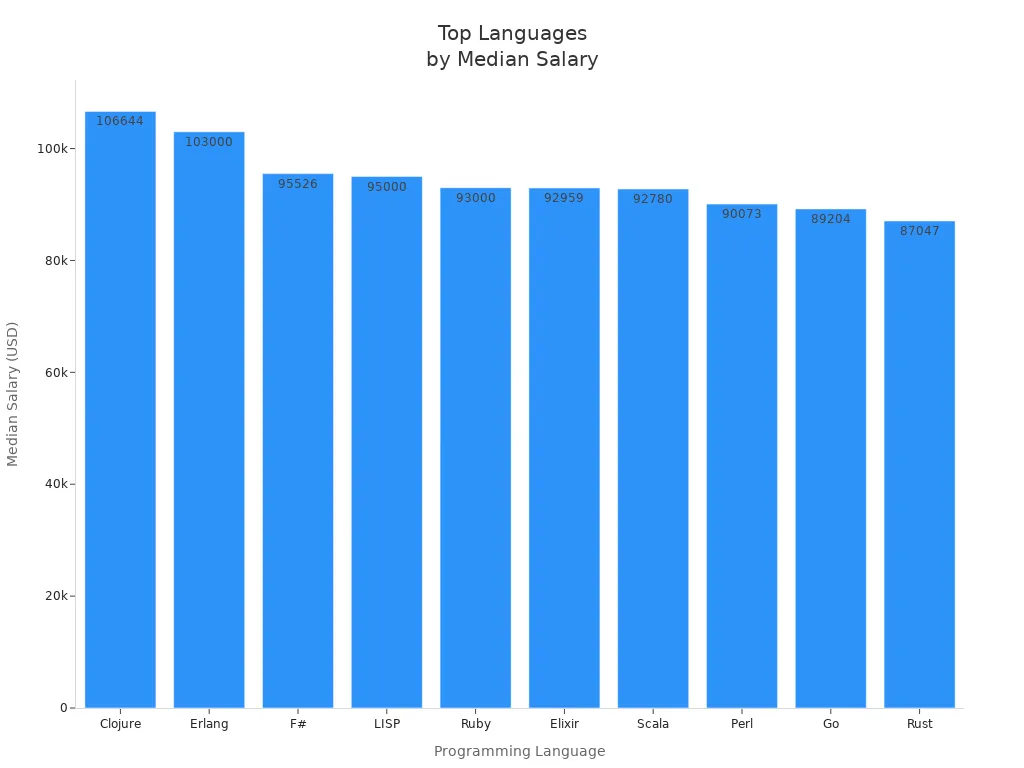
Impact on Salary
You earn more when you have advanced skills and certifications. AI technicians with cloud certifications from AWS, Microsoft Azure, Google Cloud, or IBM get higher pay. Employers pay more because you help them work faster and smarter. Jobs with AI skills pay about 28% more than similar jobs without those skills. Top AI engineers at leading companies can earn up to $680,000. Senior software engineers who do not work in AI can earn up to $340,000.
If you learn advanced technical skills, you boost your salary. In information technology, you can see a 47% salary increase when you use AI skills.
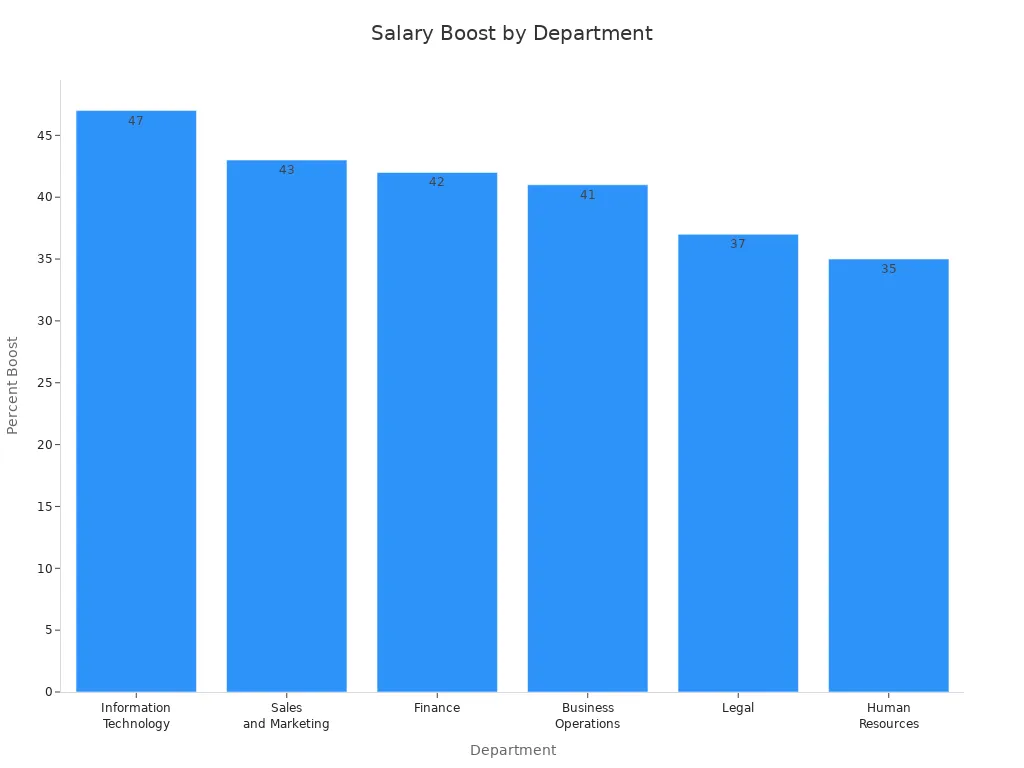
Employers expect you to be creative and automate tasks. You help improve results, so they offer higher pay. The ai technician salary reflects the value you bring with your skills and education.
Career Outlook
Growth Opportunities
You can expect strong growth if you choose a career as an AI technician or a software engineer. Both roles show impressive projected growth rates for the next decade. Here is a quick look:
Job Role | Projected Growth Rate | Time Frame |
|---|---|---|
AI Jobs | 2023 to 2033 | |
Software Engineers | 17% | 2023 to 2033 |
You see that both paths offer similar growth, but AI jobs have a slight edge. As you gain experience, you can move into advanced roles. Here are some common advancement opportunities:
Role | Description |
|---|---|
AI Software Engineer | Develops applications with AI features, focusing on scalability and user experience. |
Machine Learning Engineer | Designs and implements AI models, connecting data science and software engineering. |
Algorithm Developer | Refines algorithms for AI systems, using strong programming skills. |
DevOps Engineer for AI/ML | Keeps AI pipelines running smoothly, using cloud and DevOps expertise. |
AI Security Engineer | Builds security for AI systems, focusing on cybersecurity. |
You can also explore roles like UX Designer, AI Ethics Engineer, or AI User Experience Designer. Each path lets you specialize and increase your earning potential.
Market Demand
You will notice a surge in demand for AI technician roles. The market for AI engineering jobs grew from 35% to 60% year-over-year. This means companies want more AI talent every year. Traditional software engineering roles still grow, but at a slower pace. Many companies now look for engineers who can adapt to new technologies.
The demand for AI and machine learning roles has increased by 2,700% since 2014.
AI specialist roles show a 74% annual growth rate.
Entry-level AI engineers earn $80,000 to $120,000. Experienced professionals can earn over $150,000.
Factors driving this demand include the rise of automation, cloud computing, and the need for smarter systems. Only 2% of organizations have the right talent and technology to use AI well. If you build your skills in AI, you will stand out in a competitive job market.
Choosing a career in AI or software engineering gives you strong job security and many ways to grow. The future looks bright for both paths, but AI offers faster growth and higher demand.
Choosing a Path
Fit for Your Background
You should look at your education and experience before choosing between AI technician and software engineer roles. Both paths need a strong background in computer science or a related field. Some jobs ask for hands-on experience with machine learning or automation projects. Others value skills in natural language processing or robotics. The table below shows common backgrounds for each role:
Degree Level | Field of Study | Additional Skills/Experience |
|---|---|---|
Bachelor’s or Master’s | Computer Science or related field | Hands-on experience with machine learning projects |
Bachelor’s | Quantitative field (Math, Stats, CS) | Advanced degrees or certifications in data science |
Bachelor’s | Computer Science or related field | Experience with automation tools and projects |
Bachelor’s or Master’s | Computer Science, Linguistics, or related field | Experience with NLP projects and tools |
Bachelor’s or Master’s | Computer Science, Engineering, or related field | Extensive experience in AI implementation and successful projects |
You can see that most roles want a degree in computer science. If you enjoy building things or solving problems, both paths can fit your background.
Salary vs Satisfaction
You might think salary is the most important factor. High pay can help you reach your goals faster. However, job satisfaction matters too. You should ask yourself what kind of work you enjoy. AI technician roles often involve research, building models, and working with new technology. Software engineers focus on building and maintaining software systems. If you like fast-paced change and new challenges, AI may suit you. If you prefer stable projects and teamwork, software engineering could be a better fit.
Tip: Think about your daily tasks and what makes you feel proud at work. Sometimes, a slightly lower salary is worth it if you love what you do.
Career Planning Tips
You can make a smart choice by following a few simple tips:
Focus on core skills like clean architecture, data literacy, and communication.
Reflect on your interests and look at industry trends to find your best fit.
Choose AI roles if you want a fast-paced environment with many opportunities.
Try robotics if you enjoy hands-on work with physical systems.
Explore biotech if you like detailed, careful work and want to learn about regulations.
You should keep learning and stay open to new skills. The tech world changes quickly. Your ability to adapt will help you succeed in any path you choose.
You see that AI technician roles usually pay more than software engineer jobs. Salary growth in AI careers stands out because companies need skilled workers. You should look at market demand, salary trends, and your interests before you choose a path. If you want higher pay and fast growth, AI offers strong rewards. Software engineering gives you stability and many job options. Use the data in this guide to help you plan your future and pick the career that fits you best.
FAQ
What is the main reason AI technician salaries are higher than software engineer salaries?
You earn more as an AI technician because companies need advanced AI skills. Fewer people have these skills. Employers pay more to attract and keep top AI talent.
Do you need a master’s degree to become an AI technician?
You do not always need a master’s degree. Many AI technicians have one, but you can start with a bachelor’s degree and strong skills in programming and machine learning.
Can software engineers switch to AI technician roles?
Yes, you can switch if you learn AI skills. Start with online courses or certifications in machine learning. Practice building AI models. Employers value hands-on experience.
Which skills help you earn the highest salary in these fields?
You boost your salary with skills in Python, deep learning, cloud computing, and AI frameworks like TensorFlow or PyTorch. Certifications from AWS, Google, or Microsoft also help.
See Also
Vending Machine Engineers: Merging Mechanics With Software Skills
Understanding The Expenses Involved With Vending Machines
Pricing Insights For Tailored Vending Machine Solutions
